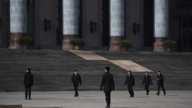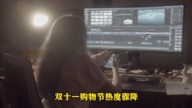【新唐人2012年10月30日訊】最近,《路透社》來自北京的一則報導顯示,不少大陸外資企業寄望中共高層十八大換屆之後,新領導層會藉支出增強經濟復甦。不過,各界對於中共領導班子定局接班之後,是否會全力拼經濟?看法不一。一名國務院的經濟官員認為,明年(2013年)將是中國經濟最為困難的一年。
報導說,目前,機械製造商「卡特彼勒」和「浦項鋼鐵」等一些在中國投資的大型企業,在面對全球經濟增長前景暗淡的困境之下,將業績成長的寄望,轉向中國新一屆領導人上任之後。「卡特彼勒」執行長道格•奧伯赫爾曼(Doug Oberhelman)向《路透社》表示,兩週前他與中國分銷商會面時,這些分析師「不約而同的認為這將是轉捩點」,他們還期待在「中國新年」之前會出現實質性轉變。
寶馬汽車首席財務官費裡德裡希.艾希納(Friedrich Eichiner)也表示:「相信下屆政府將繼續追尋『增加刺激』的路線」。
紐約(城市)市立大學經濟學教授陳志飛:「實際上,套句俗話講『肥水不流外人田』,中國政府這種刺激對像也是國營企業﹔或者是,國家重點的基礎建設項目。譬如,高速鐵路、通訊、能源這些方面,它是得到大量資金的。」
陳志飛還分析,目前中共當局唯一能作的只有投資,而且投資速度在加快。
陳志飛:「因為,如果投資這塊再趨弱的話,實際上GDP的下降會更加怵目驚心。有外界學者甚至認為,它上半年的數字有造假嫌疑。因為,它第二季度報的好像是7.6%GDP增長。專家從用電量和各方面消費等來看,它GDP增長可能就是1%左右,甚至有人說是負的。」
陳志飛指出,在這種情況之下,中共肯定啟動投資、增加基建項目來拉動GDP﹔這也是中共一貫的手法。
陳志飛:「這個錢會不會流到外資的口袋裡,我覺得這可能是有點一廂情願。因為,中國政府現在對外資,對這些常建項目的投資,還是有明確的策略的。除非你在技術上面,能夠讓它覺得有利可圖,否則不讓你介入。另外一點,即便你技術上有優勢,但是,涉及國家的所謂有戰略意義的這種項目,譬如能源、電訊還有金融這種服務性行業,實際上你還是根本沒有介入的可能。」
卡特彼勒執行長Oberhelman還表示,從中共官員處得到的訊息是,建築許可會增多,一系列基建專案將會公布。Oberhelman猜測,所有這些項目推出的時間,是在中共領導層換屆之後,大部分會是在明年春天之前。
一位不願透露姓名的國務院發展研究中心的經濟專家向《新唐人》表示,目前,中國的經濟一直在倒退。新一屆領導班子上臺之後,肯定想把中國經濟景況,發展得比前幾屆領導人來得好。不過,歐美經濟要復甦還需要時間,外部經濟危機影響了中國的經濟發展。美國的QE3政策,歐洲、中國等貨幣寬鬆的政策,只是暫時解決了經濟的困難和危機。
國務院發展研究中心經濟專家:「但是,長期的影響是通貨膨脹,就是傷害了製造業、消費業﹔長期的來講它是影響了經濟的發展,不管是哪個國家都會受到影響。中國的出口受到影響、中國的製造業受到影響、中國的人民幣也會受到影響﹔人民幣不得不升值,也對中國的經濟造成影響。這中國的經濟現在是一塌糊塗。」
這位經濟專家還指出,中國的經濟並不健全。譬如,只是「發展中國家」的中國,房地產的價格,卻因人為的炒作,比發達國家價格還高。
國務院發展研究中心經濟專家:「這就是泡沫。這泡沫當然是國家搞的、政策搞的、領導人搞的。它不這樣搞經濟發展不起來,所以中國現在不是市場經濟,是變相的計劃經濟。所以,這個經濟發展泡沫,習近平上臺以後,要不要給它擠破?我們的研究結果是,肯定會擠破。結果是經濟『嘩』下來了。他不願意維持,太纍了!還要維持每年10%的增長速度嗎,不可能了。」
這位專家估計,明年下半年,習近平一定會把經濟泡沫捅破。那麼,2013年將是中國經濟最困難的一年。
採訪編輯/梁欣 後製/李月
The Hope of Reviving Economy in China Is Frail
A Reuters report from Beijing states that many foreign
businesses in China hope the new leadership change
of the CCP 18th Congress will pour money into reviving
China’s economy.
However, people have differing opinions regarding whether
the new leadership will strive to improve the economy.
One State Council official believes 2013 will be the most
difficult year for China’s economy.
The report states that large enterprises, such as machinery
manufacturer Caterpillar and steel manufacturer POSCO,
who face dim global economic prospects, hope for sales
growth after China’s new leadership takes over.
Caterpillar CEO Doug Oberhelman told Reuters that when
he met two distributors in China two weeks ago, these analysts think there will be a turning point.
They also look forward to substantial changes
before the Chinese New Year in 2013.
BMW CFO Friedrich Eichiner also expressed that he believes
China’s new leaders will continue down the path to stimulate economy.
NYC University Professor of Economics Chen Zhifei:
“In fact, the object of the Chinese Government’s stimulus
will be state-owned enterprises and key infrastructure projects
such as high-speed railways, telecommunications, energy, etc.
They will get a lot of money.”
Chen Zifei analyses that currently the only thing the Chinese
Communist Party (CCP) authorities can do is invest, and at an accelerated pace.
Chen Zhifei: “If the investment is weak, the GDP will decline.
Some scholars even suspect China’s H1 data is fraudulent.
For example, Q2’s GDP growth was reported to be 7.6%.
Experts think it could be 1%, or even negative, based
on the consumption of electricity and other materials.”
Chen Zhifei points out that in this situation, the CCP will
for sure turn to investment and increase infrastructure projects to increase GDP.
Chen Zhifei: “Will the money go to foreign businesses?
I think this may just be wishful thinking.
The Chinese government now has a clear view
of investments in these projects.
Unless it thinks there is a benefit to the technology,
it will not let you in.
Moreover, even with a technology advantage, there is no
possibility to get into the so-called national projects
of strategic significance such as in energy,
telecommunications, and the financial service industry.”
Caterpillar CEO Oberhelman said the message from the CCP
officials is that building permits will increase and a series of infrastructure projects will be announced.
Oberhelman guesses that all of these projects will be launched
after the new leadership takes over in the spring of 2013.
An economic expert from the Development Research Center
of the State Council told NTD China’s economy has been moving backwards.
After the new leadership takes office, they will certainly
want to turn China’s economic situation over.
However, it will take time for Europe
and the U.S. economies to recover.
External economic crisis has affected China’s development.
U.S.’ QE3 policy and other monetary easing policies
in Europe, China, and other countries only temporarily solves the economic difficulties and crises.
Economic expert from the Development Research Center:
“The long-term impact is inflation, which hurts the manufacturing sector and consumers,
and affect economic development.
All countries will be affected.
China’s export is impacted, as well as the manufacturing
industry and RMB are affected.
RMB is forced to appreciate, impacting China’s economy.
China’s economy is now a mess.”
The economic experts also pointed out that China’s economy
is not robust.
For example, as a developing country, China’s real estate
is higher than developed countries as the result of inflated prices.
The economic experts: “This is a bubble created by the state
policies and leadership, the only way to boost the economy.
So China does not have a free market.
It has a twisted, controlled economy.
Will Xi Jinping break the bubble after he takes over?
We think for sure, based on our research.
The economy will decline sharply.
He does not want to maintain it. It is too exhausting.
It is not possible to maintain a growth rate of 10%.”
The expert estimates in H2 2013 Xi Jinping will break
the bubble.
2013 will be the toughest year of China’s economy.



























